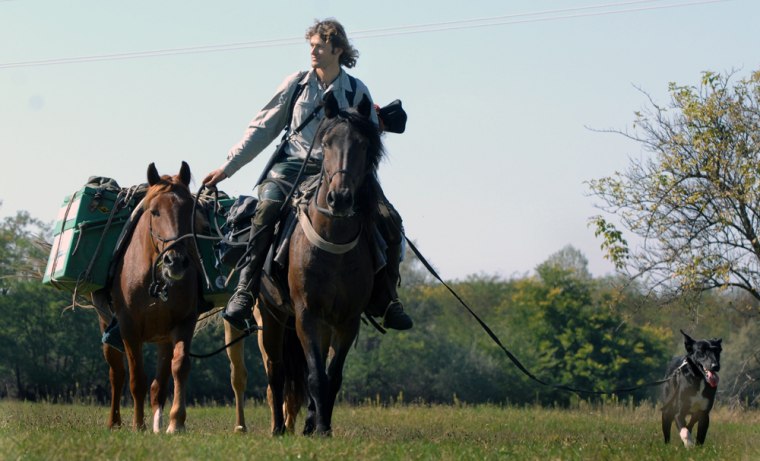He scared off wolves with firecrackers in Mongolia and rescued his dog from hungry miners in Kazakhstan. But after three years on horseback, Tim Cope has retraced the route of Genghis Khan and other Asian nomads who crossed into Europe over the centuries.
The 28-year-old Australian arrived in Hungary on Saturday, ending a 6,200-mile trek through Mongolia, Kazakhstan, southern Russia and Ukraine.
"I'm very happy to be here," Cope said in the Hungarian town of Opusztaszer, surrounded by his traveling companions — his dog and three horses. "Sometimes I didn't think I would ever arrive."
A former law student who decided to dedicate his life to adventure, writing and film documentaries, Cope was inspired to make the horseback journey during a bicycle trip from Moscow to Beijing. Trying to push his bike through the sands of the Gobi Desert, Cope watched in frustration as nomad horsemen appeared out of nowhere and disappeared over the horizon.
That got him interested in nomad life on the steppes and the journey made over the centuries by the Avars, Mongols and Huns, among other Asian groups. He set off from Mongolia in 2004 for a trip he thought would take 18 months. It ended up taking three years, and in late 2006, he had to return to Australia for several months when his father died in car crash.
According to Hungarian tradition, Magyar tribal leaders arriving from Central Asia at the end of the 9th century met in Opusztaszer, 90 miles south of Budapest, to divide the land among themselves.
"Here at the Danube River is where the Eurasian steppe ends, with its beginning in Mongolia and Manchuria," Cope said. "So Opusztaszer is the perfect ending symbolically and geographically."
Cope, 28, traveled with three horses and black hunting dog named Tigon that he received as a gift in Kazakhstan. Twice, he had to get his horses back from thieves. In the Kazakh steppes, it became so hot that he added a camel for a while.
Cope, who speaks Russian, quickly learned to trust the wisdom of locals.
Skeptical of wolf danger — at first
"In Mongolia, the nomads always told me that wolves were the most dangerous things on the steppe and I didn't believe them, at first," he said.
Then one night he found himself surrounded by howling wolves.
"When you hear that howl alone at night in the forest, it's one of the most frightening sounds you'll ever hear," Cope said. "After that I took their advice and threw firecrackers out my tent door every night to keep the wolves away."
In the Kazakh village of Akbakai, Tigon was snatched by unemployed gold miners looking for a meal. Villagers found Tigon seven days later, locked in a mine shaft and nearly frozen to death. He had to be nursed back to health with vodka and raw eggs.
When he was ready to move on, the villagers tried to help with some directions: "Go left to the old well. Turn right to the red mountain. Take a right until you see an old grave, and then take the road to the old hut ..."
"Problem was ... there were hundreds of red mountains, old graves, not to mention roads," Cope wrote in a journal on his Web site.
When he finally made it to the next town, Ulanbel, he encountered more of the Kazakh hospitality he had relied on for much of his trip.
"At passing the first house, a man spotted me from the window and came bolting out in his silky green gown and fur hat. He probably looked out this window all his life, and on this morning spotted a pretty dirty, unshaven Australian with a string of horses," Cope wrote. "Soon my horses were tied in his backyard and I was drinking tea with his family."
‘Everyone wants you to stay’
Cope says he probably spent about half of his nights in his tent and the rest in farm houses and huts of strangers along the way.
"In Kazakhstan, once you're someone's guest, it's really hard to get away, everyone wants you to stay," he said. "They believe that if you invite a guest, luck will fly into your house."
Cope brought gifts from Australia to exchange with his hosts and gave away many hundreds of photographs. "Exchanging gifts is an important thing in the steppe culture, a way for them to feel you have become a part of their lives," he said.
Cope, who won the Australian Geographic Adventurer of the Year award last year, wants to complete a book and a film about his voyage, and is already envisioning future adventures in northwest China and the Middle East.
"It's my way of life, it was not just a trip," Cope said. "I'll be back in the saddle as soon as I can."
